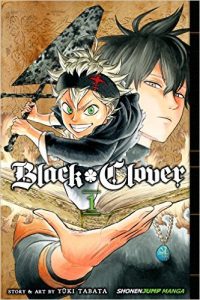By Yuki Tabata. Released in Japan by Shueisha, serialization ongoing in the magazine Weekly Shonen Jump. Released in North America by Viz.
If you’ve been reading manga for a long time, you not only start to read series that are clearly influenced by another, but also series that are influenced by their successors. When Fairy Tail debuted, a lot of people were highly amused at how blatantly it wore its One Piece influence on its sleeve (despite the author not remotely being a newbie, as Rave Master fans can tell you). Well, now Fairy Tail is 54 volumes and counting, and it’s starting to have artists who are influenced by its own plot and attitude. Which brings us to Black Clover, a story of a firey hothead who ends up in a magic guild that’s home to a bunch of eccentrics. But in Jump, not in Magazine, so it’s OK.
As I’ve noted consistently in these reviews, unoriginal and cliched does not always mean bad, particularly in the manga industry, and Black Clover did hold my interest throughout, and was a good deal of fun. But it was highly amusing coming up with a drinking game on the fly when each previously overused cliche kept dropping into the bucket. Asta, our hero, is a kid who in any other series would be happy, upbeat and relaxed, but in this particular series suffers from having no magic talent in a world where magic talent defines your place in life, and therefore he is defined more by extreme frustration adn slight obnoxiousness, which thankfully gets a bit better when he actually discovers what he can do – anti-magic.
The other characters are also types, but they seem to be the sort of types that will grow and develop into real people as the series goes on. Asta’s best friend is cool and collected, and has a giant pile of magic talent – needless to say, there’s a seemingly wide gulf in their friendship, but this is Jump, so it’s only seemingly. We also meet the supposedly terrifying master of the “evil magic guild”, who actually turns out to be the master of a lovable gang of magic users who are Just Misunderstood (TM). And then there’s Noelle, who’s from a royal family but is running into the same issues Asta has – she has magic, but can’t control it, so is thought of as useless. Putting on a haughty princess attitude to mask feeling worthless – again, not unfamiliar.
I suspect that defending the ‘have-nots’ will make up a good chunk of this manga. We see a group of villains toward the end who think nothing of using a village of commoners simply as they’re in the way, and they’re typical good, sneering villains who inspire our hero and heroine to level up. One thing I did like is Asta’s response to not having any magic for years and years – he’s been developing his body to the point where he’s freakishly strong (though he still looks like a typical wiry Jump hero), which manages to surprise many. (He also hits on nuns, but I suspect that aspect of him will go away as the series goes on.)
Black Clover may be trying to be Fairy Tail for Jump, the same way that Fairy Tail was One Piece for Magazine. but it’s off to a decent start, and I’m happy to see where it goes next.


Speak Your Mind